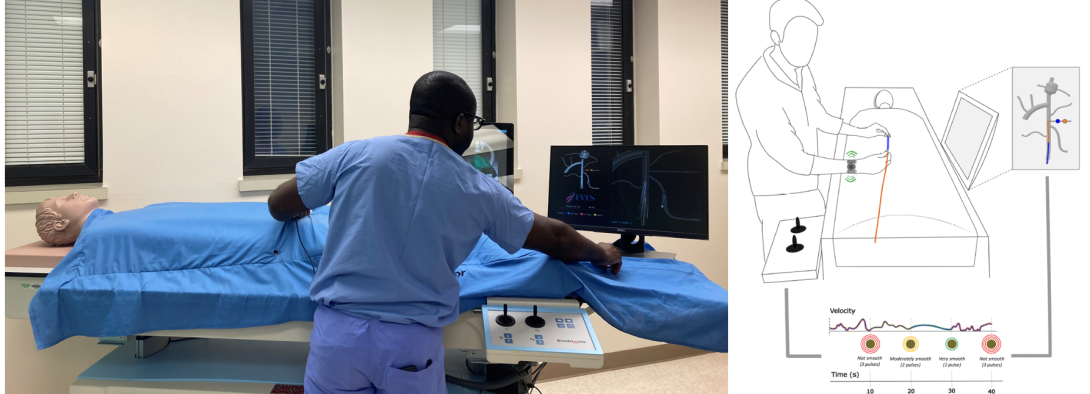Building competency in performing minimally invasive procedures is a significant effort, as trainees must acquire both procedural knowledge and manual dexterity to perform complicated tasks. If done correctly, these procedures can lead to shorter post-operative periods and fewer complications than open surgery. This is especially true in the endovascular domain, which require surgeons to navigate flexible guidewires and catheters across blood vessels to perform a variety diagnostic and therapeutic procedures such as heart valve replacements and aneurysm repair.
Current assessment of surgical skill in the endovascular domain consists of experienced surgeons evaluating trainees on their performance. This often leads to trainees receiving subjective and qualitative feedback due to variations in technique among experienced surgeons. Our approach uses movement smoothness, a metric from the field of human motor control widely regarded as a hallmark of healthy and coordinated motion, to provide an objective and quantitative measure of surgical skill. Our prior work has established that movement smoothness derived from the time and frequency-domain of guidewire tip velocities are correlated with skill level on manual, simulation, and robotic platforms. Our method of quantifying surgical skill also opens the possibility of delivering online performance feedback to trainees, given our recent work showing that providing vibrotactile cues of movement smoothness results in an increase in task completion speed and accuracy in a proxy task.
Similarly, robot-assisted minimally invasive surgery (RAMIS) assessments currently consist of domain experts providing feedback to trainees using structured grading rubrics, such as GEARS or OSATS. Like for endovascualr surgery, this feeback can be subjective and qualitiative. This leaves room for the development of objective metrics for use by trainees in the RAMIS domain. Previous work in the endovascular domain has strong strong correlation between smoothness based metrics and structured grading scores provided by expert surgeons. However, the relationship for these metrics and ground truth surgeon scores is still undetermined for RAMIS. In our work we track tool motion, using computer vision methods, to gather motion data for surgical procedures. Using gathered motion data we then use statistical and machine learning methods to establish metrics which can be used to quantify skill in the robotic surgery domain.
Our ongoing work consists of applying motion-based metrics on position and velocity data provided by an endovascular surgical simulator to define the appropriate thresholds of movement smoothness for implementing online performance feedback experiments. We are also using the simulation platform to further validate the Fundamentals of Vascular and Endovascular Surgery (FVES) training curriculum with motion data collected at clinical education workshops and from an upcoming long-term data collection program being implemented in training centers nationwide. m

